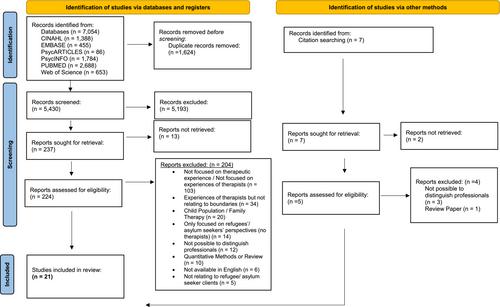Refugees and asylum seekers who have experienced trauma: Thematic synthesis of therapeutic boundary considerations
Abstract
Objective
Therapeutic boundaries are limits to appropriate behaviours within a therapist–client relationship (e.g. related to accepting gifts, self-disclosures, therapist neutrality and advocacy). Therapeutic boundary considerations are fundamental in the care of refugees and asylum seekers. Research on the experiences of therapists navigating such boundaries is sparse and warrants further exploration. The aim of this qualitative systematic review was to thematically synthesise literature regarding therapists' (psychologists, psychotherapists, counsellors) experiences of implementing flexible therapeutic boundaries with refugee and asylum seeker clients and determine how such applications have been helpful for therapeutic interventions.
Method
Six databases were searched. Following full-text screening, 21 papers were included in the analysis. Boundary theory underpinned the analysis.
Results
Three major themes were developed: (i) Changes to Therapeutic Practice & Therapeutic Intervention, (ii) Re-Conceptualisation of Therapy as ‘Clinical Political’ and Re-Conceptualisation of Therapist Identity and (iii) Careful Monitoring of Personal Boundaries—Not becoming ‘Hardened’ or ‘Haunted’. Papers described how, when used in a reflective, considerate way, flexible therapeutic boundaries can strengthen the therapist–client alliance and positively impact therapeutic interventions. Many therapists acknowledged making conscious efforts to re-conceptualise therapeutic work with refugee and asylum seeker clients from advocacy standpoints. However, systemic constraints, and lack of guidance, made this difficult to navigate and contributed to therapist burn-out.
Conclusions
Boundary considerations manifested as interpersonal, structural and cultural changes to practice. These have implications for clinical practice and developing guidelines on boundary practices with refugees and asylum seekers. Future research should explore promoting therapist well-being and training needs for therapists supporting this population.


 求助内容:
求助内容: 应助结果提醒方式:
应助结果提醒方式:


